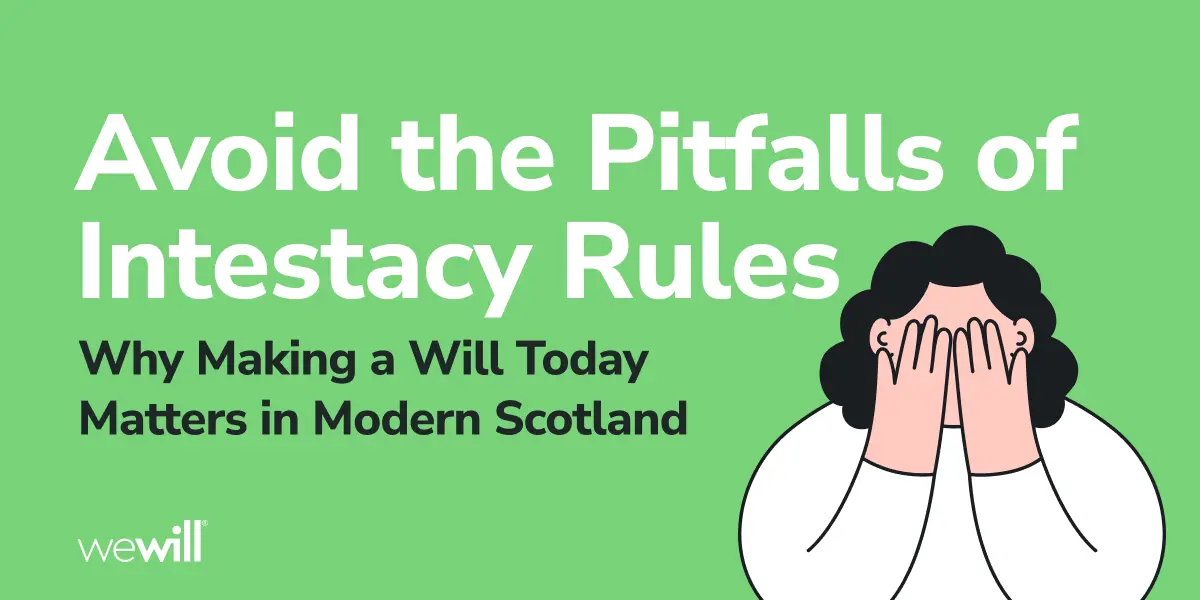A Guide to
The Rules of Intestacy in Scotland
Explore your intestacy rights in Scotland to understand how your money assets will be distributed under Scottish law if you die without a Will.
Take the Quiz Download the Free GuideTake the Quiz - Who Inherits Without a Will?
Simply answer Yes or No to a few questions, and you’ll get an eye-opening glimpse into how Scottish intestacy laws could divide your estate. Learn how these rules might impact your loved ones and who could be left out of anything!
Have you made your Will?

Your Guide to the Scottish Rules of Intestacy
Understanding what happens without a Will can be complex, but our free guide makes it simple to understand, by visually breaking down how your assets are distributed according to Scots law. Download this easy to follow guide and learn who may - and may not - inherit.
Frequently Asked Questions
Find the answers to the questions we get asked the most.
No, you do not need to use a solicitor to write a Will. You should seek the advice of a solicitor in certain circumstances, for example if you have property overseas, you and your partner or spouse have children from a different relationship, or need help with Inheritance Tax planning. Our Wills provide everything you need for a standard Will, including gifting cash and items, sharing your estate, naming guardians for your children and planning your funeral.
Answer 5 simple questions to see if WeWill meets your needs.
Yes it is. Our Will writing platform has been designed with expert legal input from Scottish solicitors and as long as each page of your Will is signed at the bottom and then signed and witnessed on the last page, your Will will be legally binding giving you peace of mind.
Solicitors typically charge over £300 to write a single Will with additional costs for any amendments you make want to subsequently make. Many cheaper online Will writing services do not offer Wills that are legally binding in Scotland. We offer a quick and easy way to make a legally binding Will under Scots Law for only £90 with unlimited updates for a year.
If a person dies without making a Will they are considered 'dying intestate', their estate will be shared according to the rules of intestacy. To avoid this happening it is always best to make a valid Will to help your family members to make sure your wishes are executed.
You have several secure storage options in Scotland. The Register of Deeds offers original documents storage for safekeeping for a small fee. Many people choose home storage in a filing cabinet, safe, or secure drawer. Just ensure your executors know the location. Professional storage services and some banks also offer secure storage facilities. The key is choosing a location that's safe from damage and accessible to your executors when needed. Read more in our Help Centre.

2024 Legal Updates
Scotland’s inheritance laws changed in April 2024 under the Trusts and Succession (Scotland) Act 2024 impacting those who die without a Will. Under the new law, separated but legally married spouses may still inherit, potentially excluding other loved ones if no Will is in place.
Additionally, cohabitants now have an extended period to make claims on an estate, but this process is neither guaranteed nor straightforward and requires court involvement.
These updates aim to protect modern families, including:
- Separated spouses: Still able to inherit unless a Will states otherwise.
- Cohabiting partners: Now have an extended time to make estate claims, though court involvement is still needed.
Minimising Family Disputes and Conflicts
When someone passes away without a Will, the lack of clear instructions can lead to family disputes, creating tension and potential legal battles.
In Scotland, intestacy laws dictate a strict order of inheritance, which may not align with what the deceased or their family had in mind. This can be especially problematic in families with blended members, stepchildren, or unmarried partners, who may be left out under default rules.
By creating a Will, you reduce the risk of conflicts, as your wishes are clearly outlined in a legally binding document.
A well-crafted Will allows you to decide exactly how assets are divided, avoiding misunderstandings and giving family members a sense of clarity and peace of mind during an already challenging time.
For many, this can lead to:
- Family disputes: Intestacy rules follow a strict order that may not align with the wishes of the deceased, especially for blended families or stepchildren.
- Clarity with a Will: By making a Will, you ensure your assets are divided as you want, reducing potential conflicts and bringing peace of mind to loved ones.
The Impact on Unmarried Partners and Stepchildren
In Scotland, the rules of intestacy don't automatically recognise unmarried partners or stepchildren, often leaving them without any inheritance rights if there's no Will in place.
This means that even a long-term partner or stepchild with whom you share a close bond may receive nothing, as the law prioritises spouses, biological children, and certain blood relatives.
For unmarried partners, this can lead to significant financial hardship, especially if they depend on shared assets like a home. Similarly, stepchildren aren't legally entitled to inherit under intestacy rules, no matter how close the relationship.
Scottish intestacy laws don’t automatically protect unmarried partners or stepchildren, which means:
- Long-term partners or stepchildren could inherit nothing.
- Avoiding hardship: A Will lets you secure a future for all loved ones, regardless of marital status.
Costly and Lengthy Legal Processes for Families
Dying without a Will in Scotland can leave families facing a complicated, time-consuming legal process.
Intestate estates, where no Will exists, require courts to follow a strict order of inheritance, which can involve extensive paperwork, legal fees, and delays. These added costs and bureaucratic hurdles can place a financial strain on families, potentially reducing the value of the estate itself.
For loved ones already dealing with the emotional impact of a loss, the additional burden of navigating intestacy laws can be overwhelming.
A Will simplifies this process, providing clear instructions for your estate's distribution and ensuring that your assets go directly to those you choose, without unnecessary delays or expenses.
Simplify the Process for Your Family
Dying without a Will in Scotland means families face a costly and time-consuming legal process:
- Strict inheritance order: Courts follow a rigid sequence, adding paperwork, legal fees, and delays.
- Avoid these hassles: A Will ensures your wishes are clear, saving your loved ones time and stress.
Prior Rights and Legal Rights
In Scotland, when someone dies without a Will, their spouse or civil partner is entitled to prior rights, a legal provision ensuring they receive a portion of the estate. This includes the right to the family home (up to a specific value), household goods, and a cash sum.
However, these rights don't necessarily align with what the deceased would have wanted, especially in cases with children or complex family structures.
After prior rights are distributed, legal rights come into play, entitling children to a portion of the remaining estate. These legal rights exist even if family members had been estranged or if the deceased had a different vision for their legacy.
Intestacy laws follow a set formula, which may inadvertently exclude other loved ones, like stepchildren or cohabiting partners.
- Prior rights: Entitlement to the family home, certain goods, and a cash sum.
- Legal rights for children: A share of the estate after prior rights are fulfilled - this could exclude other loved ones unless a Will states otherwise.
You Can Take Control
Recent legal changes highlight just how crucial it is to have a valid, up-to-date Will. Without one, your estate could be divided according to outdated laws, potentially excluding those you care about most.
With WeWill's straightforward online process, you take control - clearly naming beneficiaries, reducing the risk of family disputes, and sparing loved ones from costly legal complications.
A Will is more than just a document; it's peace of mind, knowing your wishes will be honoured, and those you love will be protected.
The simple way to write a Scottish Will
Our online Will-writing service enables you to make a legally binding document, designed with expert legal input from Scottish solicitors, in as little as 15 minutes.
Get Started